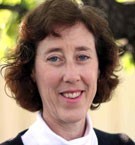This is the third part of a five-part series of blogs that chronicle the journey of a cohort of business leaders who together pursued deeper relationships with God and the integration of the resulting spiritual transformation in their personal lives into their roles as leaders in their businesses, and ultimately into the culture of their businesses as a whole. . You can read Part 1 and Part 2 at their respective links.
Mike Rundlett was another member of The Journey cohort that gathered for its first meeting on April 5, 2013, at the Ayres Hotel in Costa Mesa, CA. Mike is a certified financial planner and the owner of Rundlett Financial Services in El Cajon, CA. He has been in this business for twenty-five years and does financial planning for individuals as well as strategic planning and consulting for small businesses.
As Mike anticipated the start of The Journey, he was particularly drawn to the idea of developing as a leader. But he was anticipating something akin to traditional secular leadership seminars, with a slight spiritual twist. What occurred at The Journey, though, was not what he expected. Mike had never thought much about the idea that you had to allow time and space for God to speak to you, but he realized that the idea made a lot of sense. He was eager to experience a deeper intimacy with God.
In the business world, however, maximum efficiency and output are important. Spending extended times of personal communion alone with God did not seem to contribute to that goal. It was a process to learn to give himself permission to “do nothing” with God and not feel guilty. “This notion alone has been transforming—actually building time into my calendar to do nothing but rest in God. This is totally counter to the business culture.” Mike now consistently starts his day with an hour or two of meditation and prayer.
This priority of time alone with God first thing in the morning has led to a new focus on people. Prior to The Journey, Mike was committed to goals and agendas and to getting things accomplished. “I was all about process and plans. Putting people first was a new concept.” Now, when he leads a meeting, whether with associates or clients, he spends time focusing on the people present first before getting down to business. As a result, Mike finds himself to be “less of a hammer, more sensitive and open to people, and aware of more than just the task at hand.” Instead of an “either you cut it or you don’t” attitude, he now “looks for opportunities to bring hope and peace and love to coworkers.”
As Mike spends quiet time alone with God at the start of his day, people he will be interacting with during the day often come to mind. The Lord sometimes nudges him and gives him a word that might be an encouragement to the person. Mike says, “During my morning time of intimacy with God I have been quiet enough to receive a word from God and the courage to follow through on what I’ve heard.” One of his supervisees was not a Christian when he first came to work at Mike’s company, but has become a Christian, drawn to God in part by the more forgiving and sensitive leadership style exhibited by Mike. When a coworker was in a difficult situation and struggling to do the right thing, Mike was able to encourage the coworker and support the coworker’s ethical choice of action.
Mike was equally intrigued by the idea of integrating his spiritual life and business life. He had struggled with how God could use him in his business and thought he would have to quit his business in order to serve God. The idea of work as ministry was “completely foreign.” But through The Journey he began to see how he could use his business skills, particularly with respect to strategic planning, to help struggling organizations grow and flourish. For example, the city Mike lives in, El Cajon, CA, has the second largest population of Chaldeans—predominantly Iraqi Catholic Christians—in the United States. But the city was struggling with integrating the Chaldeans into the population. Mike was able to use his skills of breaking down complex problems and finding solutions to build bridges between the Chaldean population and others in the city, such as the police department, the mayor, and the school superintendent.
Another component of The Journey that is difficult to find in the business world is the development of close relationships characterized by openness and sharing. Being transparent and vulnerable with other business people can be risky. But in The Journey, close relationships developed with others in Mike’s mentor group. The opportunity to “break down barriers to allow transparency and sharing, to be myself, who I am without a façade” was an important part of the transformation process encouraged in The Journey. Engagement with The Journey community “keeps me strong and on the right track; without regularity and accountability it is easy to veer off course.”
Mike’s business is no longer based purely on economic considerations. It is more a part of who he is—an outpouring of the ways in which God is transforming his heart. “My Christianity isn’t put on hold when I walk into work; this is who I am, whether I’m at work or not.” And this transformation process is ongoing. “I’m in the middle of a process of transformation that has yet to be completed; The Journey was critical to that, but there’s more to come…I’m sure of it.”
 şÚÝ®ĘÓƵ
şÚÝ®ĘÓƵ
.jpg)


